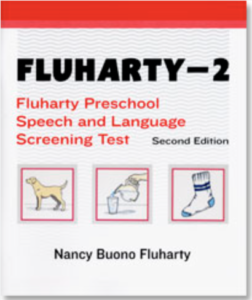Giving the Fluharty Preschool Speech and Language Screening Test 2nd Edition (FLUHARTY-2)
The FLUHARTY-2 is a standardized screening measure that is administered to determine if a child needs a full speech and language evaluation. The FLUHARTY-2 is for children ages 3-6 years.

This screener uses a combination of manipulatives as well as the traditional picture manual. It takes about 10 minutes to give and is very easy to administer!
FLUHARTY-2 Areas of Assessment
The FLUHARTY-2 includes the following subtests:
- Articulation: Evaluates ability to produce target sounds in the initial and final positions of words
- Repeating Sentences: Evaluates the ability to repeat spoken sentences of increasing length and complexity without changing word meaning or content
- Responding to Directives: Evaluates the ability to interpret spoken directions of increasing length and complexity
- Answering Questions: Evaluates ability to answer personal questions
- Describing Actions: Evaluates ability to label actions in pictures
- Sequencing Events: Evaluates ability to sequence at least 3 steps in daily tasks
Scoring the FLUHARTY-2
Like other full standardized measures, the evaluator tallies up the number of correct responses for each subarea and obtains a standard score. Since the FLUHARTY-2 screens both speech and language, the evaluator recommends if a full speech and language evaluation is needed.

Speech and Language Milestones
Children develop rapidly between 3-7 years. So, below are speech and language milestones to reference. If a child is having difficulty meeting milestones, a full speech and language should be recommended.
3-4 years:
- Sentences become more complex (4-5 words).
- Speech is mostly intelligible to strangers.
- Engages in longer conversations, sharing experiences and ideas.
- Understands concepts of time (e.g., yesterday, tomorrow).
4-5 years:
- Sentences become more grammatically correct and longer (5-6 words).
- Vocabulary expands to about 1,500 words.
- Tells stories and talks about past events.
- Follows 2-3 step instructions accurately.
5-6 years:
- Grammar and sentence structure continues to improve.
- Uses more advanced vocabulary and complex sentences.
- Participates in group discussions and expresses opinions.
- Understands and uses basic rules of conversation.
6-7 years:
- Language skills become more adult-like.
- Can engage in detailed and coherent conversations.
- Understands and uses more complex language structures.
- Reading and writing skills develop further.
For more info on report writing, check out these resources- ⬇️
Blog post: Write a Great Speech and Language Report
FREE course: Write Speech and Language Reports Like a Boss
